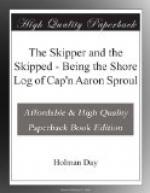“Go ahead and state,” commanded the Cap’n.
“I reckon it better be in private,” advised the other, his pale-blue eyes resting dubiously on Hiram.
“I ain’t got no secrets from him,” said the Cap’n, smartly. “Break cargo!”
“You’ll wish you heard it in private,” persisted Mr. Crowther, with deep meaning. “It ain’t northin’ you’ll be proud of.”
“I’ll run along, I guess!” broke in the old showman. “It may be something—”
“It ain’t,” snapped the Cap’n. “It’s only about them timberlands that my wife owned with her brother, Colonel Gideon Ward. Estate wasn’t divided when the old man Ward died, and since we’ve been married I’ve had power of attorney from my wife to represent her.” His jaw-muscles ridged under his gray beard, and his eyes narrowed in angry reminiscence.
“We’ve had two annual settlements, me and her brother. First time ’twas a free fight—next time ’twas a riot—third time, well, if there had been a third time I’d have killed him. So I saved myself from State Prison by dividin’ accordin’ to the map, and then I sent Crowther up to look the property over. There ain’t no secret. You sit down, Hiram.”
“Considerin’ the man, I should think you’d have done your lookin’ over before you divided,” suggested the showman. He scented doleful possibilities in Mr. Crowther’s mien.
“If I’d done business with him fifteen minutes longer by the clock I’d have been in prison now for murder—and it would have been a bloody murder at that,” blurted the Cap’n. “It had to be over and done with short and sharp. He took half. I took half. Passed papers. He got away just before I lost control of myself. Narrowest escape I ever had. All I know about the part I’ve got is that it’s well wooded and well watered.”
“It is,” agreed Mr. Crowther, despondently. “It’s the part where the big reservoir dam flows back for most twenty miles. You can sail all over it in a bo’t, and cut toothpicks from the tops of the second-growth birch. He collected all the flowage damages. He’s lumbered the rest of your half till there ain’t northin’ there but hoop poles and battens. All the standin’ timber wuth anything is on his half. I wouldn’t swap a brimstun’ dump in Tophet for your half.”
“How in the devil did you ever let yourself get trimmed that way?” demanded Hiram. “It’s all right for ten-year-old boys to swap jack-knives, sight unseen, but how a man grown would do a thing like you done I don’t understand.”
“Nor I,” agreed the Cap’n, gloomily. “I reckon about all I was thinkin’ of was lettin’ him get away before I had blood on my hands. I’m afraid of my own self sometimes. And it’s bad in the family when you kill a brother-in-law. I took half. He took half. Bein’ a sailorman, I reckoned that land was land, acre for acre.”
“The only man I ever heard of as bein’ done wuss,” continued Mr. Crowther, “was a city feller that bought a quarter section of township ’Leven for a game-preserve, and found when he got up there that it was made up of Misery Bog and the south slope of Squaw Mountain, a ledge, and juniper bushes. The only game that could stay there was swamp-swogons, witherlicks, and doodywhackits.”




